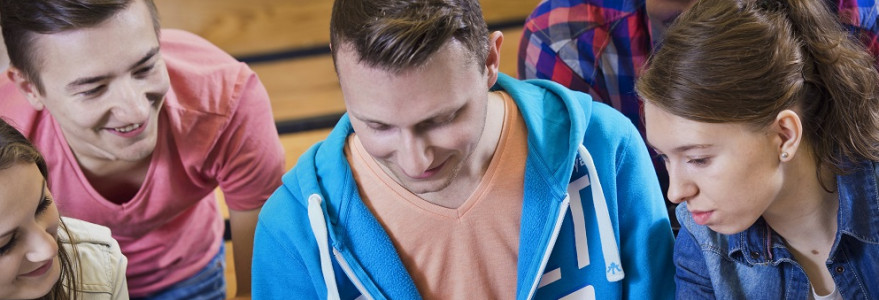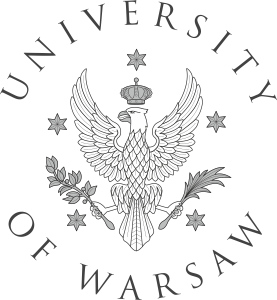4EU+ workshops on Open Science
20 października 2021
What is Open Science? What happens with a scientific publication between the time of writing and the formatted paper published in an academic journal? What are the Creative Commons licenses? These aspects of Open Science will be explored during a series of online workshops organised by the universities of the 4EU+ Alliance, including the University of Warsaw. Registration is open now. The first training meeting will take place on 8th November.
The series of workshops consists of 14 classes that will be held online. They will be devoted to the various aspects of Open Science, e.g.:
- What is Open Science?;
- Cycle of scientific publication: an overview;
- Strategies for publishing in Open Access journals;
- Data Management Plans – one tool with many applications;
- Research Impact & Bibliometrics: open science, society, innovation.
The workshops will be conducted in English by experts from all six member universities of the 4EU+ Alliance: University of Warsaw, Charles University (Czech Republic), University of Heidelberg (Germany), Sorbonne University (France), University of Copenhagen (Denmark) and University of Milan (Italy). UW will be represented by: Dr. Zuzanna Wiorogórska and Szymon Andrzejewski.
The classes are addressed to doctoral candidates, senior researchers, research support or anyone interested. Registration forms for each workshop and contact details are available on the 4EU+ website >>
The first class will be held on 8th November.
Source: www.en.uw.edu.pl
Post-doctoral position available within NCN grant OPUS
15 października 2021Supramolecular Chemistry Laboratory is looking for 2 postdoctoral researchers for a research project at the border of organic, medicinal, and supramolecular chemistry.
The project aims to develop small organic molecules capable of selectively transporting biologically relevant anions through lipid bilayers. Such molecules may exhibit interesting anti-cancer, antibacterial and antiviral properties, and may also find applications in the treatment of numerous diseases resulting from the dysfunction of natural transporters. Within the project, we would also like to construct stimuli-responsive transporters whose activity could be controlled by pH, light, or redox potential.
Project leader: Michał Chmielewski, Ph.D.
Deadline: November 15, 2021
For more info visit: www.mchmielewski.pl/en or see the attachment.
An announcement for Post-doc position
11 października 2021Position of post-doc in the SONATA project entitled „Structure-function studies of human PNPase” financed by the National Science Centre, Poland, is open for application. Project leader: dr Katarzyna Bandyra. Deadline for applications: 11 November 2021. For more info see >> pdf
An announcement for post-doc position
Project Manager – prof. Karol Grela (Head of Organometallic Synthesis Laboratory, Faculty of Chemistry, University of Warsaw) is looking for candidates to work in a scientific project: „Making the Impossible Possible: Macrocyclisation of Unbiased Dienes at High Concentration by Ring-Closing Metathesis”, programme Opus supported by National Science Centre positions: Post-Doc (2) – Assistant in a group of research workers, operating in the field of exact and natural sciences. Deadline for applications: 11 Novemeber 2021. For more info see >> pdf
An announcement for post-doc position
Project Manager – prof. Karol Grela (Head of Organometallic Synthesis Laboratory, Faculty of Chemistry, University of Warsaw) is looking for candidates to work in a scientific project: „Unorthodox concepts in olefin metathesis”, programme Maestro supported by National Science Centre positions: Post-Doc (1) – Assistant in a group of research workers, operating in the field of exact and natural sciences. Deadline for applications: 11 November 2021. For more info see >> pdf
Seminar CeNT 15.10.2021
The Centre of New Technologies invites to a webinar by
Andrei Lupas,
Max Planck Institute for Developmental Biology, Tybinga, Niemcy
Title: The revolution in protein structure prediction
Date: 15th October 2021, Friday
Time: 1:00 pm (Central European Summer Time)
Host: dr Stanisław Dunin-Horkawicz
Zoom link: https://us02web.zoom.us/j/82426581314
Seminars can also be watched in the Auditorium (room 0142).
To subscribe to receive announcements about CeNT UW seminars or to unsubscribe please click here
CeNT-UW-Webinars-instruction-for-attendees
Abstract:
I was the assessor for high-accuracy models in last year CASP experiment (Critical Assessment of Structure Prediction), in which computational groups try to predict the three-dimensional structure of proteins for which neither they nor the organizers know the answer at the time of prediction. For the first time in CASP history all targets ended up being high-accuracy targets, because one predictor (AlphaFold2) predicted structures at an accuracy that often rivaled that of experimental methods. After being actively engaged in CASP for over two decades and seeing essentially no progress between 2002 (CASP5) and 2016 (CASP12), I had given up hope that the protein folding problem would be breached in my lifetime, but now it has. I will cover as far as I can the main questions I am constantly asked: What happened at CASP14? Are AlphaFold2 predictions as good as crystal structures? Is the protein folding problem now solved? Does AlphaFold2 predict protein interactions? Dynamics? Unstructure? Where do the other leading groups stand (Baker, Zhang, Tencent)? I will also try to outline some thoughts about how this will impact the Life Sciences.
An announcement for a post-doc position
07 października 2021Position of post-doc (a group of science positions) in the research project entitled „Theoretical design and prediction of phosphorescent emissive materials based on halogen bonding interactions and experimental verification of their properties” financed by National Science Centre (NCN) is open for application. Project leader: Dr. Mihails Arhangelskis. Deadline for applications: 6 November 2021. For more info see >> pdf
An announcement for Post-doc position
06 października 2021Position of post-doc in the OPUS project 2020/39/B/NZ2/01301 entitled „Development of tools for the rational design of peptide therapeutics” financed by the National Science Centre, Poland, is open for application. Project leader: dr hab. Sebastian Kmiecik. Available positions: 2. Deadline for applications: 6 November 2021. For more info see >> pdf
Cultural Orientation Workshops at UW 2021

Welcome Point will organise “Cultural Orientation Workshops”. Its main goal is to provide all newcomers at the University of Warsaw with tools that will ease their life in a new place at the very beginning. The event will be held on 15th October.
Welcome Point of the University of Warsaw is organising “Cultural Orientation Workshops” for international students (long-term students only).
The event is organised to help international students at UW earn more about Poland, the city of Warsaw, culture shock experience, communication in a multicultural environment, and more.
The workshop (in English) will take place on 15th October between 10:00 am and 4:30 pm at the Volunteer Centre of the University of Warsaw office (in the building of the University of Warsaw Library, 56/66 Dobra Street).
It will be conducted by Katarzyna Kucharska, a trainer from the Volunteer Center of the University of Warsaw.
Application deadline: 8th October, midnight. To participate, one needs to register.
Source: www.en.uw.edu.pl
Seminar CeNT 8.10.2021
04 października 2021The Centre of New Technologies invites to a webinar by
Csaba Szántay,
Title: What makes „a good researcher”? Part II
Date: 8th October 2021, Friday
Time: 1:00 pm (Central European Summer Time)
Host: dr hab. Krzysztof Kazimierczuk
Zoom link: https://us02web.zoom.us/j/82426581314
Seminars can also be watched in the Auditorium (room 0142).
To subscribe to receive announcements about CeNT UW seminars or to unsubscribe please click here
CeNT-UW-Webinars-instruction-for-attendees
Abstract:
Do renowned researchers owe their success to the fact that they are simply more „talented” than others, or is there some other „secret” involved? What exactly is the nature of their special „talent”? Can that „talent” be learned? Are you, as a potential researcher, struggling with the question whether you are „talented” enough to build a successful and fulfilling career in research? What kinds of competencies are required in that regard from a researcher by the various research institutions or industrial research sites? Should you choose the industry or academia for your research career? Does the university provide you with the right kind and right amount of knowledge so that you can „make it” in the „real world”? If not, in what ways should you improve yourself? What is (or should be) the true merit of a PhD degree (besides its ego-boosting effect that you can put „Dr.” in front of your name) when you start your workeither in academia or in the industry? Douniversities fully realize what skills should be mostly developed during a PhD program? Do research facilities fully realize what they can or should expect from such PhD programs? What skills are needed to be demonstrated in a job interview? Although these questions, and many related ones, are of utmost importance at an individual as well as an institutional level, they are typically not addressed with sufficient conscientiousness, and are poorly understood by all involved parties, i.e. students, supervisors, research institutes and industrial R&D facilities, etc. Furthermore, the topic is surrounded by many misguided stereotypes and myths, especially about what it means to be „talented” as a researcher, which can have rather negative practical consequences. In this admittedly somewhat off-the-wall, and perhaps even provocative, presentation I will attempt to discuss these issues on the basis of having gained quite a lot of experience as a researcher as well as a manager of a research unit in both a heavy-duty pharmaceutical industrial research environment, and also in a university setting. Based on this experience, I will argue that while technical expertise and a sufficient degree of „smartness” are of course important qualities, the „talent” that really matters in the long run is dominated by skills that will be referred to as „attitude competencies”. I will mention a number of such skills, including the attitude-driven ability to avoid the „mental traps” that can easily affect even the smartest and most experienced scientific minds. 1 In all, the messages to be conveyed will probably be surprising, but hopefully also inspiring with a positive outlook on the „secret” of being a „good researcher”.

